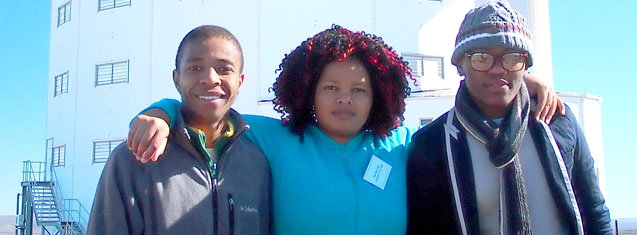Latest News Archive
Please select Category, Year, and then Month to display items
20 December 2021
|
Story Igno van Niekerk
|
Photo Igno van Niekerk
![]() Dr Samantha Potgieter, Senior Lecturer in the Department of Internal Medicine and Dr Nicholas Pearce, Senior Lecturer in the Department of Surgery comment on their team members’ commitment and determination during the pandemic.
Dr Samantha Potgieter, Senior Lecturer in the Department of Internal Medicine and Dr Nicholas Pearce, Senior Lecturer in the Department of Surgery comment on their team members’ commitment and determination during the pandemic.
On the forefront of the battle against the COVID-19 pandemic, two UFS doctors are leading a team of inspired healthcare workers in a superhuman effort to make a positive difference.
With the pandemic in its second year and the recurring challenges of new waves and strains consistently in the news, one would expect the doctors to be tired. However, quite the opposite is true. Upon entering the office where Dr Samantha Potgieter, Senior Lecturer in the Department of Internal Medicine and Dr Nicholas Pearce, Senior Lecturer in the Department of Surgery are in a meeting with colleagues, the debate is vibrant; an energetic sense of mission.
Miraculously succeeded
My brief is to collect stories and experiences they’ve had over the past 18 months at the Tumelo ward for general and high-care patients, where the team has miraculously succeeded in not running out of oxygen or ventilators, despite handling high volumes of patients from the Free State and Northern Cape. “We saw those pictures of piled-up bodies in Italy. We were committed to avoiding that at all costs. And we did.”
Success stories? First mentioned are their team members’ commitment and determination. The team had to stand in when families could not support dying patients. “They did not die alone. Our team was there.”
“Really sad and frustrating are the deaths that could have been prevented. Unvaccinated patients. They arrive ill, wanting to know if they can get it. Too late...” – Dr Nicholas Pearce
Then came hope
Sad stories? The past year has had its share of sad stories. “Someone comes in during the morning, needs oxygen, in the afternoon they are in ICU, then ventilator – and then they die. We’ve never faced anything like this before.”
Then came hope. Vaccines. Dr Pearce is in charge of the vaccination site at Universitas Hospital. “Really sad and frustrating are the deaths that could have been prevented. Unvaccinated patients. They arrive ill, wanting to know if they can get it. Too late ...” He opens his cell phone – shares the stats. “We can handle 2 000 vaccinations a day. At the moment about 250 comes in.” He shakes his head.
“We can beat this virus, but we need to stand together ...”
Students attend prestigious National Astrophysics and Space Science Programme
2014-08-22

From the left are: Thokozane Ngcongwane with Mbali Xaba and Thabo Kumalo (both third-year Physics and Chemistry students).
Three students from our Qwaqwa Campus – Thokozane Ngcongwane, Mbali Xaba and Thabo Kumalo – were recently selected to attend the prestigious National Astrophysics and Space Science Programme (NASSP). The programme – in partnership with the National Research Foundation (NRF) – ran for two weeks at the South African Astronomical Observatory (SAAO) in Cape Town.
The project targets students from formerly disadvantaged institutions of higher learning, where astronomy and astrophysics are not offered.
Students are invited to apply for the programme, with emphasis placed on students majoring in mathematics and physics. Students from other fields are also invited to apply, though. The programme allows for the development of black astronomers and astrophysicists, which are in demand in the ever-growing environment of astronomy in South Africa.
“Topics such as gravitational lenses, black holes, stellar evolution and the mysteries of cosmology were presented and students were invited to engage with the speakers during and after the presentations,” said Ngcongwane, a third-year Zoology and Entomology student.
The programme challenged them to work on basic astrophysical concepts in groups while individual written assignments were part of the learning process as well.
“Given the lack of information about the complexities of astronomy the students had, this was the most ideal time to learn about all matters astronomy and astrophysics as lectures offered a lot to young and excited minds,” Ngcongwane said.